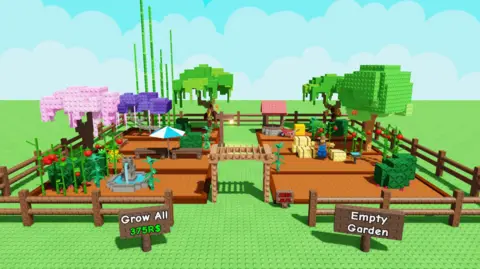The recent rise in the popularity of virtual gardening games, particularly within the realm of online gaming platforms like Roblox, marks a fascinating shift in player interests. One of the standout examples of this trend is *Grow a Garden*, a game that allows players to nurture their small patches of land through a serene, immersive experience. Unlike the typical action-packed games that dominate the market, *Grow a Garden* invites more than 16 million players, predominantly children, to engage in gentle and patient gardening endeavors over the weekends.
The immense popularity of this title is remarkable, especially when juxtaposed with traditional action games like *Fortnite*. Remarkably, *Grow a Garden* has achieved a record for concurrent players, a feat previously held by the adrenaline-driven *Fortnite*. This begs the question: what is it about this calming gardening simulator that creates such an enticing draw for players? Additionally, could it potentially inspire a transition from virtual gardening to real-life horticulture?
In *Grow a Garden*, players are granted a humble brown plot where they can purchase seeds and witness the growth of their plants through relaxing background music, with the game even allowing growth to continue when players are offline. The gameplay encapsulates a soothing experience, promoting patience and gradual progress. Upon harvesting their crops, players can sell their produce or even venture into a playful competition with friends regarding who can collect the most in-game currency, known as Sheckles.
The youth demographic, particularly those aged 13 and under, represents about 35% of the player base, illustrating a significant interest among younger audiences. Children such as seven-year-old Eric Watson Teire from Edinburgh express their enjoyment of the game, reveling in the friendly competition to grow the best plants. This community aspect appears to fuel the game’s popularity, providing players with the opportunity to engage socially through shared experiences.
However, not everyone is enamored with the game’s concept, as detractors liken it to “watching paint dry.” Despite this, some players appreciate the game’s slower pace, recounting the thrill associated with the cultivation of plants. Elder brother Owen highlights the estimated worth of in-game items, such as a mythical candy blossom tree, sparking interest in virtual collectibility and trade.
Roblox, as a platform, serves as a massive ecosystem with around 40 million user-created games and experiences, showing its reach among the youth. Its vast user base, with 97.8 million daily users earlier this year, underscores its significant place in the gaming world. However, this popularity isn’t without its challenges, as concerns regarding the safety of young users and online interactions arise. Exploitation and addiction issues have also been noted, prompting Roblox to reiterate their commitment to player safety.
The game’s developers, including Janzen Madsen and his team at Splitting Point Studios, aim to tap into fundamental aspects of gardening that captivate players—planting seeds and witnessing growth. While the gap between virtual gardening and engaging in actual gardening remains, there is a glimmer of hope among advocates that familiarity with virtual gardening might encourage young audiences to explore real-life gardening as a hobby.
Experts such as Professor Andrew K. Przybylski from the University of Oxford offer a more skeptical outlook, suggesting that the game is unlikely to instigate passion for real gardening akin to the way *Super Mario Wonder* does not inspire plumbing careers. However, both Professors Przybylski and Sarah Mills recognize the implications of in-game financial systems on young players’ experiences and engagements with technology and economics.
As children, like Owen and Eric Teire, engage in both virtual and authentic gardening, it becomes evident that they enjoy the mechanics introduced in *Grow a Garden*, even if their ultimate preference lies within the gaming experience. The interplay between blissful play and practical gardening hints at the evolving relationship between gaming and real-world hobbies, igniting curiosity for the future of digital gardening. Ultimately, *Grow a Garden* is more than just a game; it mirrors the cyclical journey of cultivation—both in-game and potentially in reality.



